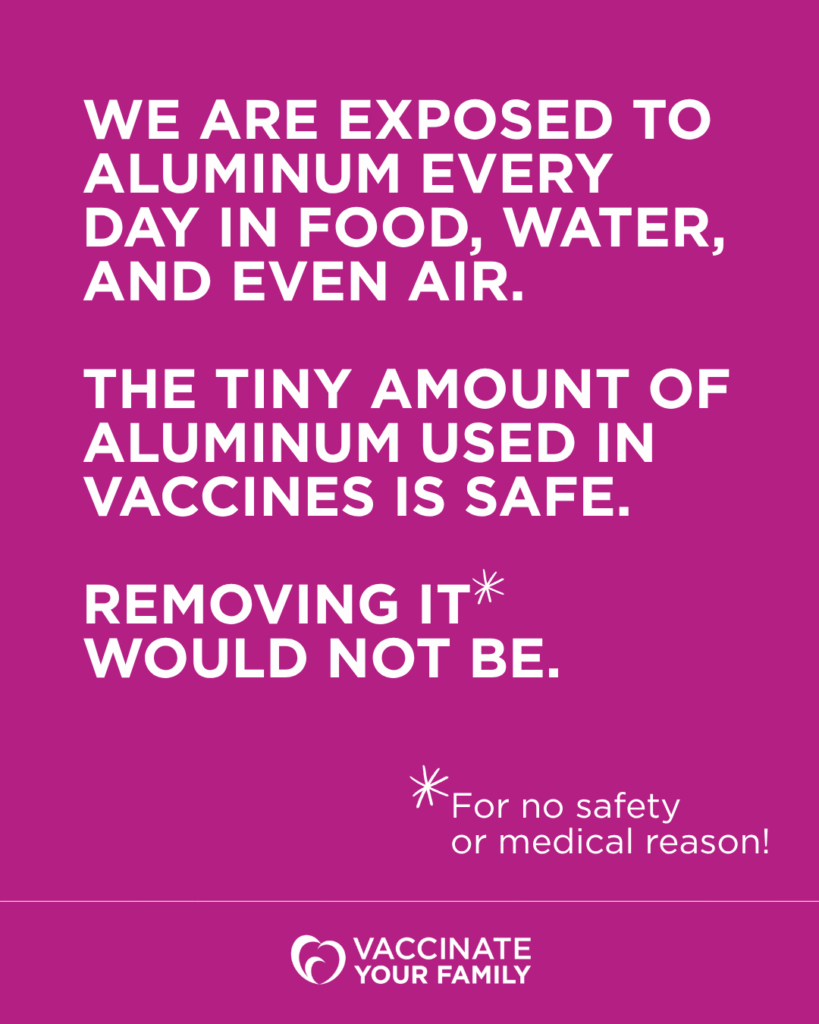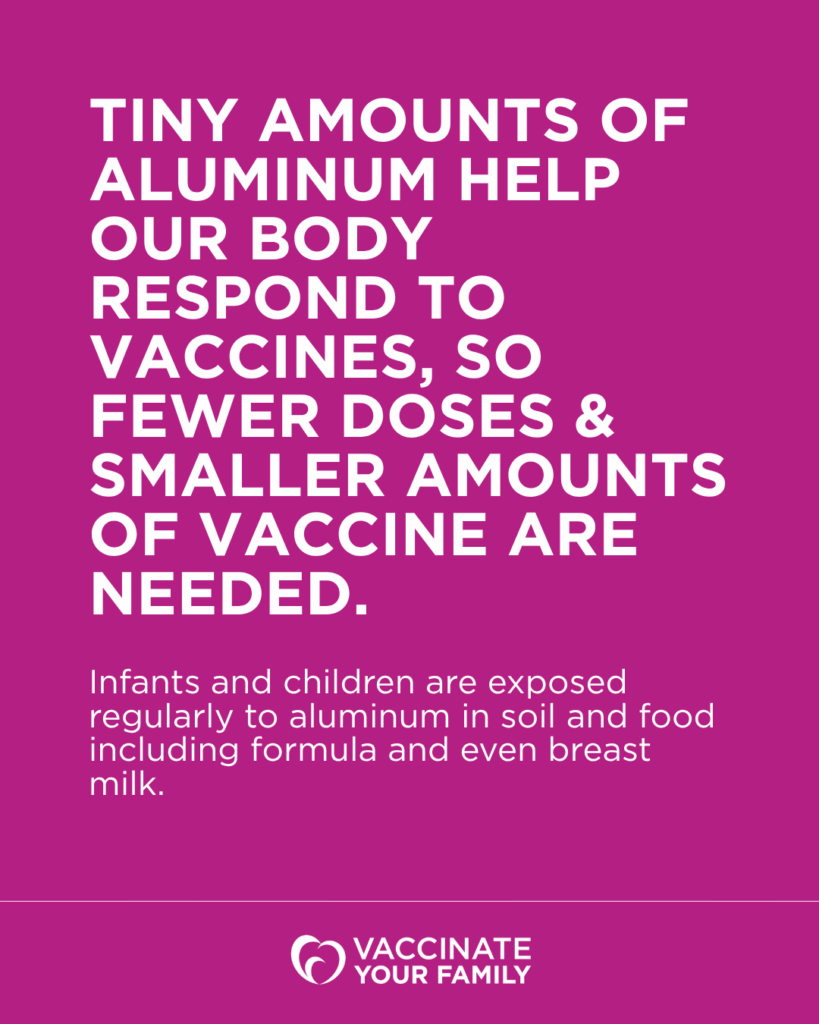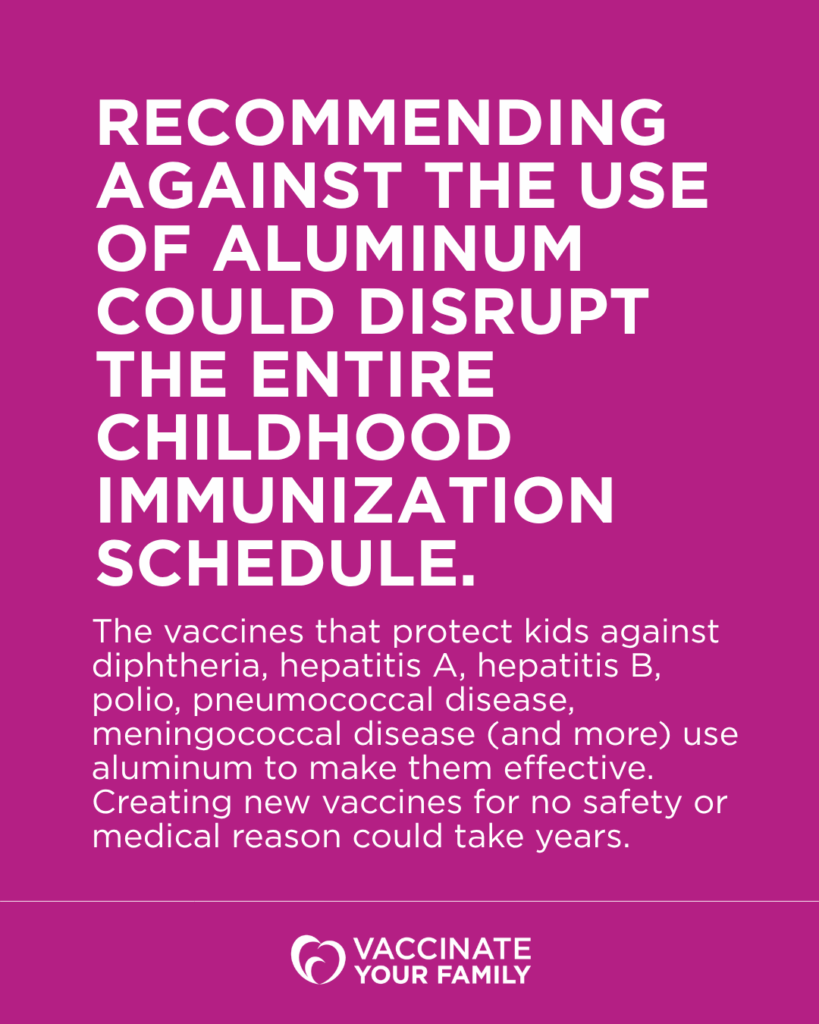Another Day, Another Concern: What You Need to Know About Aluminum in Vaccines
Aluminum is used to help our immune system respond to some vaccines. Exposure to aluminum in vaccines is minimal, and there is broad agreement from decades of research that it is safe. We are constantly exposed to aluminum–in what we eat, in how our food is stored, and in nature.
There is a lot of vaccine-related news right now, and confusion is swirling. If it feels like every day there is a new concern about vaccines, you are not alone. The Centers for Disease Control and Prevention (CDC) just announced the new Advisory Committee on Immunization Practices (ACIP) Childhood and Adolescent Immunization Schedule Work Group (WG) Terms of Reference, which establish the WG’s goals of re-evaluating the safety and efficacy of the childhood immunization schedule.
What’s an ACIP Work Group?
ACIP work groups are typically groups of experts, including government employees, researchers, and providers that have extensive experience in data science, administering vaccines, and/or conducting research. These work groups prepare for months to years to create new recommendations that are voted on by the ACIP and adopted as the nation’s vaccine schedule.
The ACIP-recommended immunization schedule has a unique regulatory role in determining vaccine coverage and access for Americans.
As part of this work group, they will evaluate questions like “do either of the two different aluminum adjuvants increase the risk of asthma?”
These questions, which have already been answered by many studies, create confusion. Let’s break down what we know about aluminum and its role in vaccines.
Why is aluminum in vaccines?
Aluminum is used in vaccines as an adjuvant. Adjuvants help boost our immune response to the vaccine–that can mean smaller doses and less doses. Almost 100 years ago, researchers discovered that aluminum helps our immune systems respond to vaccines.
Is aluminum safe?
Yes! The quantities of aluminum in vaccines are very small. Vaccines are tested and studied extensively by researchers and approved by the federal government to ensure they are safe before they can be used.
Aluminum is everywhere, which means infants are regularly exposed to aluminum in their day-to-day lives. In the first six months of life, infants ingest aluminum through formula and breast milk as well as through the environment. But just like formula and breast milk, vaccines are safe and essential to keep our babies healthy.
What’s more, because aluminum adjuvants make vaccines more effective and reduce the number of vaccine doses needed, using them can actually lower a child’s overall chances of experiencing side effects following vaccination. That means not only is aluminum safe when used in vaccines, but it can also make vaccination safer and more effective for our kids.
Is there a difference in the aluminum that is ingested vs. injected?
Yes! The aluminum in vaccines gets into your bloodstream because it is injected, while only a small portion of the aluminum that is ingested (eaten) is absorbed through your digestive system into your blood stream. However, because so much more total aluminum is eaten than is included in vaccines, over time most of the aluminum in the blood stream is from food you eat. Once it’s in the bloodstream, aluminum from injection and ingestion is processed the same – it is filtered by the kidneys and removed in urine.
Could aluminum in vaccines be causing asthma?
In 2023, an observational safety study on childhood vaccines flagged a potential safety signal where aluminum in childhood vaccines correlated with asthma in some groups. This safety signal is taken very seriously, and researchers have followed up on it by looking at extremely large data sets and setting up new studies for deeper follow-up. To date, this finding has not been replicated by any of the safety follow-up studies. There were some notable limitations of the study itself: the study did NOT show that the aluminum in vaccines causes asthma, or that aluminum is toxic or causing harm to children. The study did not factor in environmental exposures that are also known to cause or be correlated with asthma – like air pollution or exposure to tobacco smoke. The study also did not account for how much aluminum children were exposed to in other ways, like through their food or baby formula. And the study did not have data on how many of the children were breastfed– a known protective factor against developing asthma.
Research into the safety of vaccines and their ingredients – including aluminum – is extremely important and safety monitoring is done constantly with great effort and care. When a safety signal like this is identified, it is not dismissed but researched further. The good news is that the vast majority of evidence supports that aluminum is safe and does not cause harm, and has not been shown to cause asthma.
I hear people calling to take aluminum out of vaccines–would that create new problems?
Tiny amounts of aluminum are in many of our routine childhood vaccines, including those that help protect us against diphtheria, hepatitis A, hepatitis B, polio, human papillomavirus, pneumococcal, meningococcal, and more life-threatening diseases. Even though aluminum is only a small part of a vaccine, it is essential to how it works.
Removing aluminum from these vaccines would completely change the vaccine. That means manufacturers would have to create new formulations, conduct new clinical trials, and launch new products–a process that typically takes over a decade.
If Health and Human Services (HHS) and CDC were to require the removal of aluminum from vaccines, that would remove vaccines that protect against 10 of the diseases recommended in the childhood and adolescent immunization schedule.
The childhood immunization schedule protects against up to 18 different diseases, so that is over half of the immunization schedule.
There is no evidence that removing aluminum from vaccines would make America healthier, but it would damage our childhood immunization system. This fractured system could leave our communities and families at risk of outbreaks and dangerous diseases.
Social media sharing & more resources:
Please help share this important information! These social-ready graphics are downloadable. Here’s a suggested caption (or write your own!) → Aluminum is used to help our immune system respond to some vaccines. Exposure to aluminum in vaccines is minimal, and there is broad agreement from decades of research that it is safe. We are constantly exposed to aluminum–in what we eat, in how our food is stored, and in nature. Despite this, a newly established work group of the ACIP has identified aluminum as a potential target – but recommending against the use of aluminum could disrupt the entire childhood vaccination schedule, and jeopardize our children’s protection against diseases like polio, diphtheria, and more.


